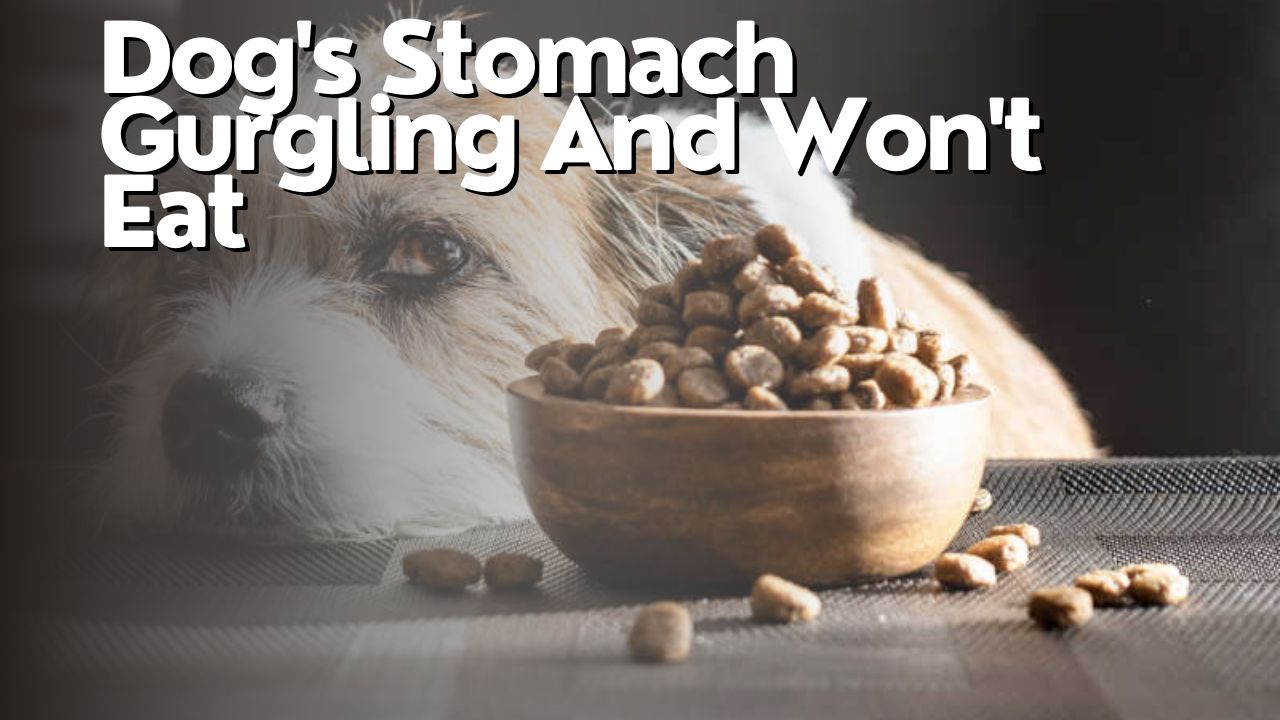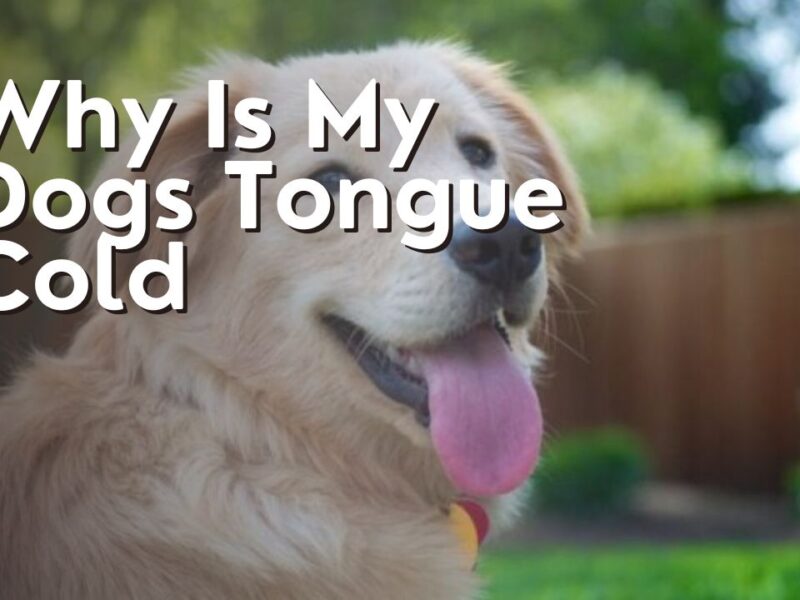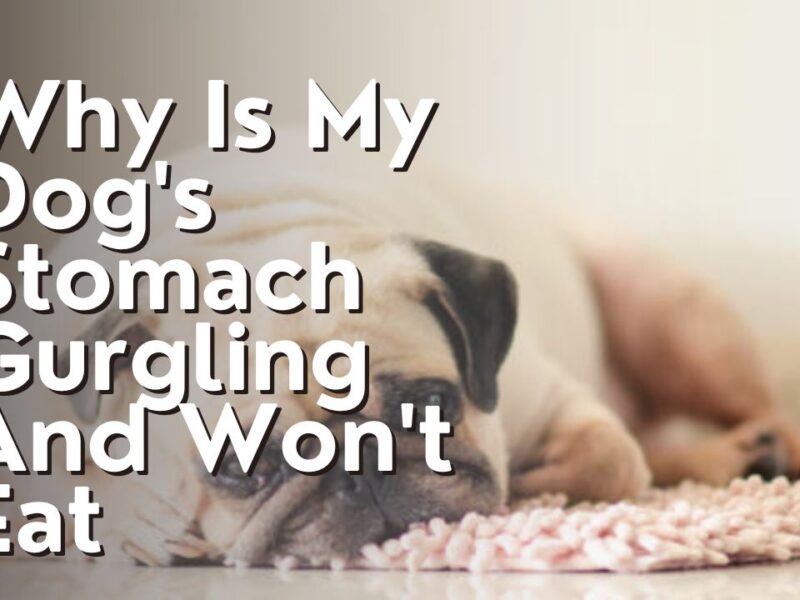Hey there, I’m no veterinarian, but I’ve had my fair share of experience with dogs and their quirky stomachs. So, here’s the deal: if you’ve noticed your dog’s stomach making some strange gurgling noises and they’re not showing much interest in their food, you’re not alone. It’s a common issue that can happen for a variety of reasons.
In this article, we’ll explore the common causes of stomach gurgling in dogs and share some tips to help relieve their discomfort. We’ll also discuss when it’s time to seek veterinary care and offer some home remedies for a dog’s loss of appetite. And, of course, we’ll wrap things up with some preventative measures to keep your furry friend’s tummy happy and healthy.
So, let’s dive in and find out what’s going on with your pup’s tummy!
Common Causes of Stomach Gurgling in Dogs
The most common reasons for a dog’s stomach gurgling and loss of appetite are usually harmless, like a rumbling thunderstorm brewing in their belly.
One possible cause is hunger. Just like humans, dogs can experience hunger pangs, especially if they haven’t eaten for a while.
Another common cause is dietary indiscretion, which refers to when dogs eat something they shouldn’t have. This can lead to an upset stomach and gurgling sounds.
Additionally, dogs may experience stomach gurgling due to excessive gas. This can occur if they eat too fast or swallow a lot of air while eating or drinking.
Stress and anxiety can also contribute to stomach gurgling in dogs. Just like humans, dogs can experience digestive upset when they are feeling stressed or anxious.
Lastly, certain medical conditions, such as gastroenteritis or pancreatitis, can cause stomach gurgling and loss of appetite in dogs. If your dog’s stomach gurgling persists or is accompanied by other concerning symptoms, it is important to consult a veterinarian to rule out any underlying health issues.

Tips to Relieve Stomach Gurgling
When it comes to relieving stomach gurgling in dogs, there are a few key tips that have helped me with my own pup.
First, I’ve found that slowing down mealtime can make a big difference. By giving smaller, more frequent meals and using puzzle toys or slow feeders, it helps to prevent gulping and excessive air intake.
Secondly, providing a balanced diet that is easily digestible can help to reduce stomach irritation. I’ve found that sticking to high-quality, grain-free foods with limited ingredients has been beneficial.
Lastly, managing stress and anxiety in dogs can also help to alleviate stomach gurgling. Whether it’s through exercise, mental stimulation, or calming techniques, finding ways to keep your pup relaxed can make a big difference.
Of course, it’s always important to consult with a veterinarian if your dog’s stomach gurgling persists or if you have any concerns.
Slow Down Mealtime
Although it’s tempting to rush through mealtime, it’s important to slow down and give your dog time to properly digest their food.
When a dog eats too quickly, they can swallow air, leading to stomach gurgling and discomfort.
To help slow down mealtime, try using a slow feeder bowl or puzzle toy that requires your dog to work for their food. This will not only extend their eating time but also provide mental stimulation.
Another tip is to divide their meals into smaller portions and feed them multiple times throughout the day. This will prevent them from gobbling down their food all at once.
Additionally, make sure to eliminate any distractions during mealtime, such as loud noises or other animals, as these can cause your dog to eat faster.
By implementing these strategies, you can help relieve your dog’s stomach gurgling and promote healthier digestion.
Provide a Balanced Diet
To ensure optimal digestion and overall health, it’s crucial to offer your furry companion a well-balanced diet. Here are four important components to include in their meals:
- Protein: Incorporate lean sources of protein such as chicken, turkey, or fish to support muscle development and repair.
- Carbohydrates: Provide complex carbs like brown rice or sweet potatoes for sustained energy and a healthy digestive system.
- Healthy fats: Include sources of omega-3 fatty acids like salmon or flaxseed oil to promote a glossy coat and reduce inflammation.
- Fiber: Offer fiber-rich foods like vegetables or pumpkin to aid digestion and prevent constipation.
By incorporating these key elements into your dog’s diet, you can help alleviate stomach issues and ensure they receive the necessary nutrients for a happy and healthy life.
Manage Stress and Anxiety
Take a deep breath and find ways to calm and comfort your furry friend during times of stress and anxiety. Dogs can experience stress and anxiety just like humans, and it can affect their appetite. Here are some tips to help manage their stress and encourage them to eat:
| Tip | Description | Example |
|---|---|---|
| 1 | Provide a safe space | Set up a cozy corner with their favorite blanket and toys. |
| 2 | Use calming techniques | Try gentle massages or playing soothing music. |
| 3 | Establish a routine | Stick to a regular feeding schedule to create a sense of security. |
Remember, patience is key when dealing with a stressed dog. Give them time to adjust and offer reassurance with gentle words and affection. By creating a calm and comforting environment, you can help alleviate their anxiety and restore their appetite.
Consult with a Veterinarian
When your furry friend is experiencing stress and anxiety, it’s important to consult with a veterinarian to ensure their well-being. The veterinarian will be able to assess your dog’s condition and provide appropriate guidance and treatment options. Here are five reasons why consulting with a veterinarian is crucial:
- Accurate diagnosis: A veterinarian can accurately diagnose the cause of your dog’s stress and anxiety, which could be due to a medical condition or behavioral issues.
- Tailored treatment plan: Based on the diagnosis, the veterinarian can create a personalized treatment plan that addresses your dog’s specific needs and helps alleviate their stress and anxiety.
- Medication options: If necessary, the veterinarian can prescribe medication that can help manage your dog’s stress and anxiety effectively.
- Behavior modification techniques: A veterinarian can recommend behavior modification techniques to help your dog cope with stress and anxiety in a positive and healthy way.
- Follow-up support: The veterinarian can provide ongoing support and guidance to monitor your dog’s progress and make any necessary adjustments to the treatment plan.
Consulting with a veterinarian is essential to ensure the well-being of your beloved furry companion.
When to Seek Veterinary Care
If your dog’s stomach is persistently gurgling and they refuse to eat, it may be time to seek veterinary care. Persistent or severe symptoms can indicate a more serious underlying issue that needs medical attention.
Additionally, if your dog is experiencing vomiting or diarrhea, it could be a sign of an illness or digestive problem that requires professional evaluation.
Lastly, changes in behavior or appetite can be red flags for potential health issues and should not be ignored.
Persistent or Severe Symptoms
Dealing with a dog whose stomach won’t stop gurgling and who refuses to eat can be incredibly frustrating. In some cases, these symptoms may resolve on their own with time and rest. However, if the symptoms persist or worsen, it is important to seek veterinary care promptly.
Persistent or severe symptoms could indicate a more serious underlying issue, such as an obstruction or an infection. If your dog is experiencing persistent vomiting, diarrhea, abdominal pain, or lethargy, it is crucial to consult with a veterinarian. They will be able to perform a thorough examination, run necessary tests, and provide appropriate treatment.
Remember, it’s always better to err on the side of caution when it comes to your pet’s health.
Vomiting or Diarrhea
After experiencing persistent or severe symptoms in my dog’s stomach, I noticed a concerning development: vomiting or diarrhea.
It’s distressing to see my furry friend in such discomfort. Their stomach gurgling has intensified, and they have no appetite whatsoever.
It’s a constant worry, not knowing what could be causing these symptoms. I’ve tried different remedies and even adjusted their diet, but nothing seems to provide relief.
The frequent episodes of vomiting and diarrhea have left me feeling helpless and concerned for their well-being. I know it’s crucial to seek veterinary attention to identify the underlying cause and provide appropriate treatment.
My priority now is finding a solution to alleviate their discomfort and get them back to their happy, healthy self.
Changes in Behavior or Appetite
Experiencing sudden changes in behavior or appetite with your furry friend can be concerning and leave you wondering what could be causing these worrisome symptoms.
As a dog owner, I know how distressing it can be when your dog’s stomach is gurgling and they refuse to eat.
It’s important to pay attention to any accompanying signs such as lethargy, excessive drinking, or vomiting.
These changes in behavior or appetite could indicate a variety of underlying issues, including gastrointestinal upset, stress, or even a more serious condition.
To determine the cause, it’s best to consult with a veterinarian who can perform a thorough examination and run necessary tests.
Remember, it’s always better to be safe than sorry when it comes to our furry companions’ health.
Home Remedies for a Dog’s Loss of Appetite
If your pup’s tummy is rumbling and they won’t chow down, there are some home remedies you can try to help stimulate their appetite. When my dog’s stomach is gurgling and he’s not interested in eating, I’ve found these remedies to be helpful:
- Warm Up Their Food: Heating up your dog’s food can make it more aromatic and appealing, which might entice them to eat. Just be sure to let it cool down to a safe temperature before serving.
- Offer Small, Frequent Meals: Instead of giving your dog one big meal, try offering smaller portions throughout the day. This can reduce the pressure on their stomach and make it easier for them to eat.
- Add Some Tasty Toppings: Sprinkling some low-sodium chicken broth or a small amount of cooked, lean meat on top of their food can add flavor and make it more enticing. Just be careful not to go overboard with the toppings, as they can lead to weight gain if used excessively.
Remember, if your dog’s loss of appetite persists or is accompanied by other concerning symptoms, it’s important to consult your veterinarian for proper diagnosis and treatment.

Preventing Stomach Issues in Dogs
To keep your furry friend’s appetite strong and digestion running smoothly, it’s crucial to take proactive steps in preventing stomach issues. As a responsible dog owner, I have learned a few tricks to keep my dog’s stomach happy and healthy. First and foremost, I make sure to feed my dog a balanced and nutritious diet. I avoid giving him table scraps or foods that are known to cause stomach upset, such as spicy or fatty foods. Additionally, I always provide fresh water for him to drink throughout the day.
Regular exercise is also important in preventing stomach issues in dogs. I take my dog on daily walks and engage him in playtime to keep his digestive system active and functioning properly. Another crucial aspect of preventing stomach issues is maintaining a regular feeding schedule. I feed my dog at the same time every day to help regulate his digestion.
Lastly, I have found that incorporating certain supplements into my dog’s diet can help promote a healthy stomach. I use a probiotic supplement to support his gut health and aid in digestion. It’s always best to consult with your veterinarian before starting any new supplements.
By following these preventative measures, I have been able to minimize the occurrence of stomach issues in my dog. Keeping his stomach happy and healthy is essential for his overall well-being and ensures that he maintains a strong appetite.
| Tips to Prevent Stomach Issues in Dogs |
|---|
| Feed a balanced and nutritious diet |
| Avoid giving table scraps |
| Provide fresh water at all times |
| Maintain a regular feeding schedule |
Frequently Asked Questions
Can stomach gurgling in dogs be a sign of a serious health issue?
Stomach gurgling in dogs can be a sign of a serious health issue. It could indicate gastrointestinal problems, such as an upset stomach, digestive disorders, or even an obstruction. It’s important to consult a veterinarian for proper diagnosis and treatment.
Are there any over-the-counter medications that can help with stomach gurgling in dogs?
There are no over-the-counter medications specifically for stomach gurgling in dogs. It’s best to consult a veterinarian to determine the underlying cause and appropriate treatment for your dog’s symptoms.
How long should I wait before seeking veterinary care for my dog with stomach gurgling?
I should seek veterinary care for my dog with stomach gurgling if it persists for more than 24 hours or is accompanied by other concerning symptoms like vomiting, diarrhea, or lethargy.
Can stress or anxiety contribute to stomach gurgling in dogs?
Stress and anxiety can contribute to stomach gurgling in dogs. It’s important to address the underlying causes of their stress and provide them with a calm and secure environment to help alleviate their symptoms.
What are some common foods that can cause stomach gurgling in dogs?
Common foods that can cause stomach gurgling in dogs include fatty or spicy meals, dairy products, and foods high in fiber. It’s best to avoid these and stick to a balanced diet for your furry friend’s digestive health.
Conclusion
In conclusion, if your dog’s stomach is gurgling and they won’t eat, it is important to identify the underlying cause and take appropriate action. Common causes of stomach gurgling in dogs can include digestive issues or dietary indiscretion.
By following the tips to relieve stomach gurgling and considering home remedies for loss of appetite, you may be able to help your furry friend feel better. However, if the symptoms persist or worsen, it is crucial to seek veterinary care for a proper diagnosis and treatment.
Additionally, preventing stomach issues in dogs through a balanced diet and regular exercise can promote overall digestive health.


